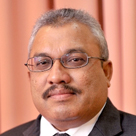
Abdulla Jihad
Vice President of the Republic of Maldives
Economy / Maldives
“We are proud of what we have achieved in the last few years”
As the first five-year term of President Abdulla Yameen comes to a close, his administration has begun to take inventory of the major goals it has achieved over this tenure, including the delivery of 24-hour electricity, a rapid increase in per capita GDP and the securing of large funds from the Gulf to expand the international airport, what Vice President Abdulla Jihad calls the Maldives “most critical project.” Vice President Jihad confirms with us that an investment forum in Dubai last December has further initiated funds from the UAE into the aviation sector, and that his administration has begun negotiations with Dubai to create a new port.
Can you provide some examples of how the Maldives’ economic rise has impacted the average Maldivian?
We are proud of what we have achieved in the last few years. You can see tangible results on the ground, including the delivery of 24-hour electricity and nationwide 3G & 4G services. In 2013, our GDP was around $7,000 per capita and now we are at around $10,000 per capita. For these past five years, we have also created around 75,000 jobs. At the end of the year, we’re aiming to reach 90,000 to 93,000 jobs, most of which will come from tourism.
President Yameen’s next vision is to provide water services to all islands, hopefully within the next five years. We also have to pave roads on major islands. Our target is to attract more people towards Malé. The president envisions around 70% of the population living near the Greater Malé Region, and around 30% in the remaining islands. President Yameen is also developing regional airports, and our target is to have a regional airport in each atoll so people don’t have to rely on seaplanes alone.
What results did the Maldives Investment Forum (MIF) in Dubai produce?
Following the MIF, the Abu Dhabi Fund for Development announced that it would be investing $60 million in the construction of a new international airport in Maafaru in Noonu Atoll. Moreover, the Fujairah Aviation Academy visited the Maldives and they’ve shown interest in establishing an aviation academy here. They have done some assessments looking into creating the base in Dhaalu Atoll.
How is the Maldives planning to position itself as a hub for Islamic finance in the Indian Ocean?
The Ministry of Finance has marked land in Hulhumalé that is reserved for the development of an international finance center, where both Islamic and conventional banks will be located. The Maldives Center for Islamic Finance (MCIF) is working to develop the capacity in the Islamic finance industry by training people through cooperation with Malaysian banks and universities. Today, we have the country’s first fully Islamic bank, the Maldives Islamic Bank, and an Islamic window in the Bank of Maldives.
Why is the Maldives considered to be one of the best returns on investment in Asia?
If you manage a resort, you can easily break even after seven years. Investors are attracted to this economically viable model and its sustainability. We are also equidistant from Middle East and the Far East. A flight to Dubai or Singapore takes four hours. This makes for a strategic location between two thriving regions.
What achievements can your administration underscore as part of its political legacy?
One of our major achievements is the Malé-Hulhumalé Bridge, which is on track to be in use within a few months’ time. With this bridge, people and cargo can finally move easily from Hulhumalé to Malé, and vice versa. However, the most critical project in the Maldives is the airport expansion. Relieving airport congestion is really critical because there are about 23 resorts coming up, adding around 4,000 beds in total. We cannot cater to those resorts with the kind of congestion we have now. Sometimes, aircraft have to hover around the airport for half an hour or more, burning a lot of fuel. But if there is a better runway, along with a taxi way, we can cut down congestion and increase the number of flights to and from the Maldives.
Why is the UAE-Maldivian relationship so important today?
Being the 40th year of our diplomatic relations, we can celebrate because our relationship is getting stronger. Our airports are partly financed by Abu Dhabi, which also financed our airport in the early-70s. Because of their close cooperation, we have been able to grow. We have five flights per day from Dubai, which plays an important role in our development because they are carrying large amounts of tourists to the Maldives. Businesses from the UAE are interested to develop resorts here, and in the near future we’ll have more resorts built by Emiratis. We are currently in negotiations with the Dubai Ports Authority to develop a port at Thilafushi.
Looking forward, I think we can expect a lot of Emiratis to make a second home for themselves in the Maldives. The International Finance Center will work to attract more talent and investment. Hulhumalé will draw brands and companies which recognise it to be an ideal home for their operations – perhaps as far as housing their major regional presence. I would like to think that we can begin to apply new technology, like artificial intelligence for example, especially in the tourism industry — to bring automation where it’s needed and where it can make that critical difference. These are technologies that Dubai is already experimenting with, and the Maldives could benefit from this knowledge and translate it to mutual gains.
